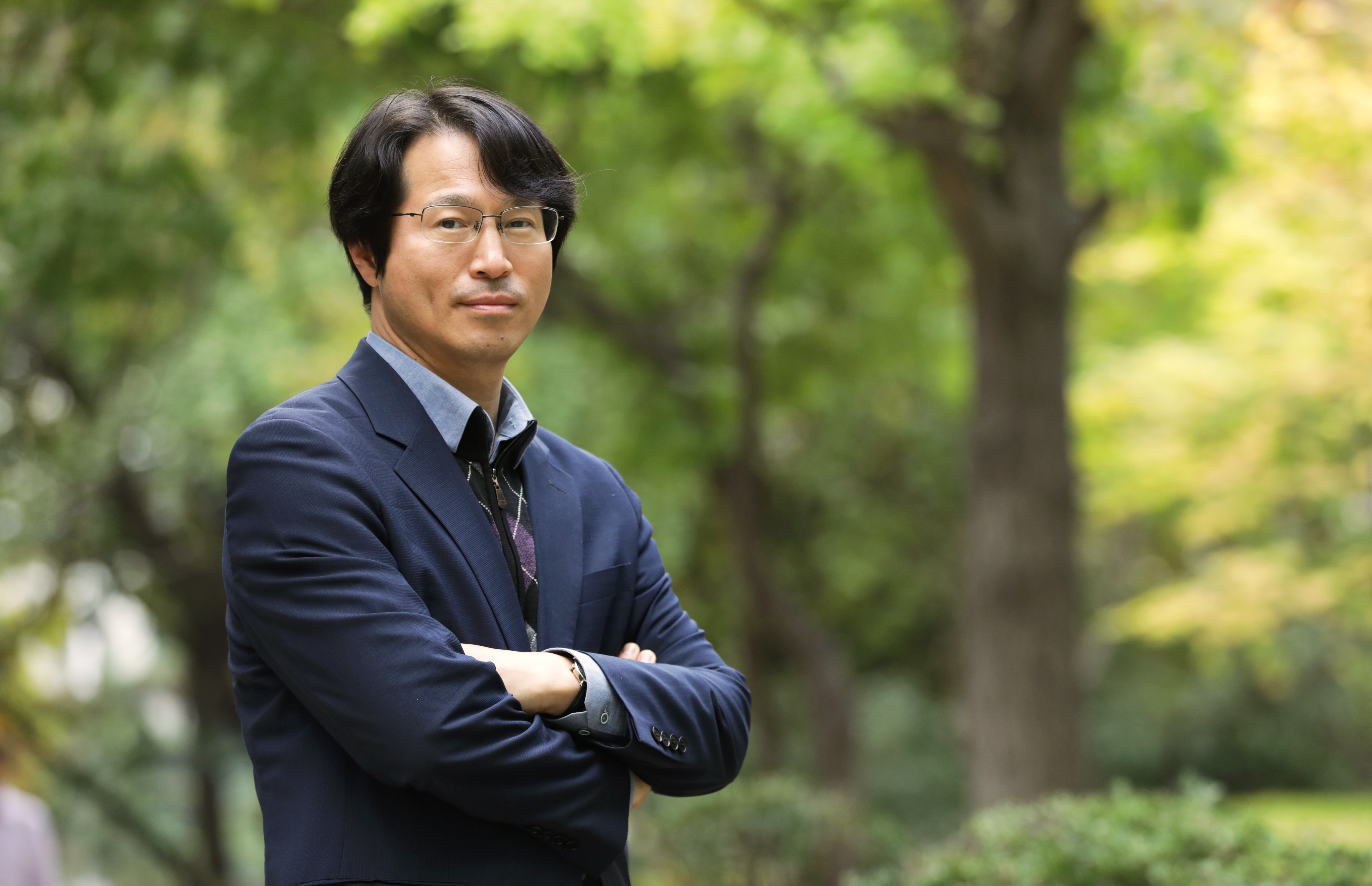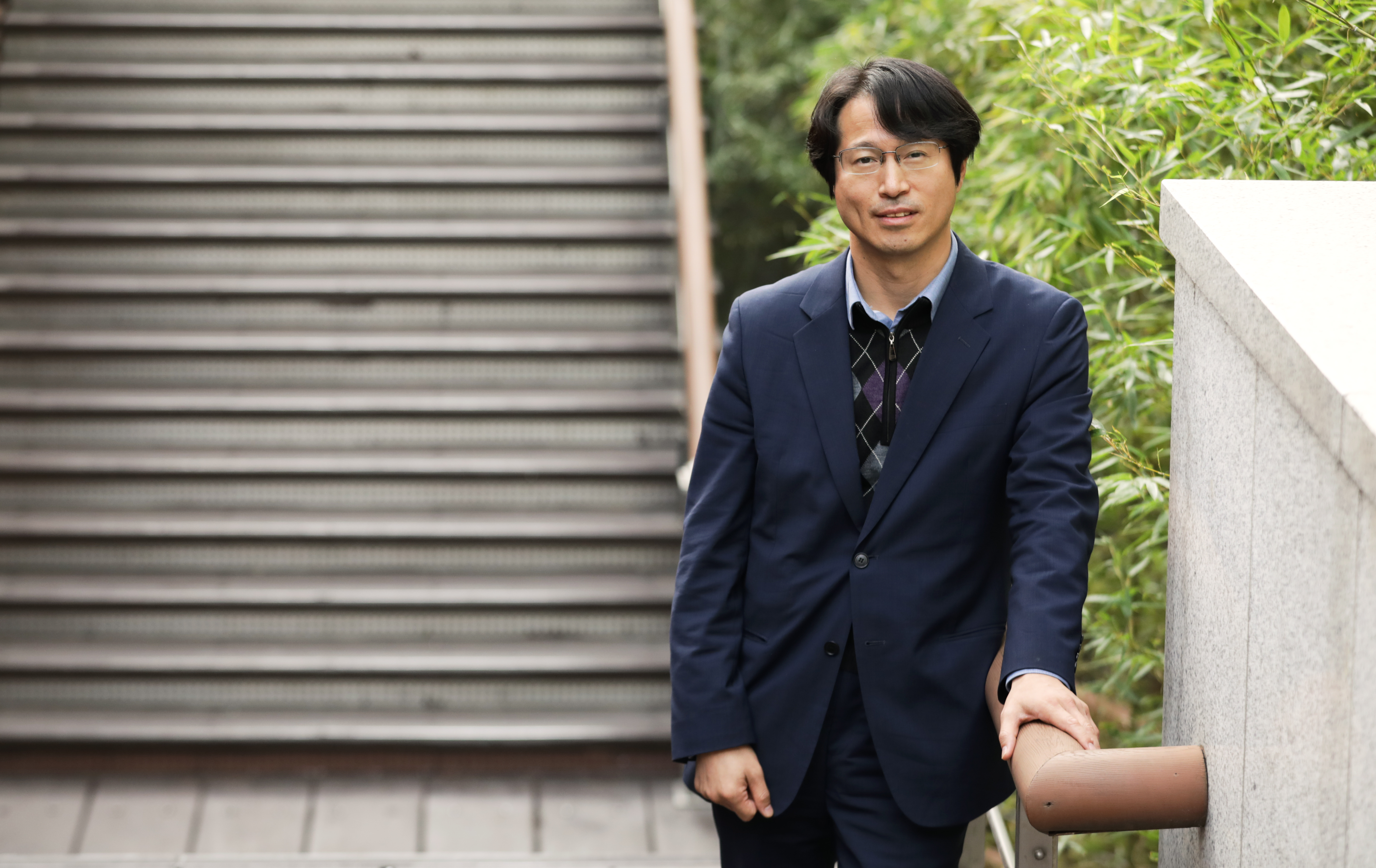
Lee Young-chae, a professor at Keisen University in Tokyo, says people-to-people exchange and collaboration between Koreans and Japanese can help thaw bilateral relations between both countries.
By Yoon Sojung
Photos = Kim Sunjoo
Seoul | Oct. 31, 2019
"Civic society is the last hope to make changes in Japan," says Lee Young-chae, a professor at Keisen University in Tokyo.
While four months have passed since Japan decided to impose export restrictions on Korea, Lee said cooperation between the civic societies of both countries can help find a clue to improve bilateral relations.
Often appearing on Japanese talk shows to fight anti-Korean sentiment from Japanese right-wing elements, the professor said, "Japanese civic society has protected its national consciousness and peace, and is the main force protecting the Peace Constitution."
Lee said the situation can be resolved through direct dialogue and creating a bond between the people of the two nations, adding that collaboration between their civic societies can help thaw frozen bilateral relations.
Korea.net on Oct. 31 held an interview with the professor in Seoul to learn more about voices within Japan on the matter and his proposals for improving Korea-Japan relations.
- It's been four months since Japan decided to impose export restrictions on Korea. How do the Japanese people view the bilateral trade spat with Korea?
Not well. The Abe administration's decision is ultimately hurting its own economy. The export restrictions are de facto retaliation. Japan initially expected Korea to make concessions or give up. Instead, it unexpectedly triggered a prolonged large-scale boycott of Japanese goods in Korea. This has damaged Japanese companies. The trade spat has also hurt Korean companies, but Japan's trade surplus with Korea has greatly narrowed. Tokyo is thinking how to resolve this situation.
- Reports say certain tourist destinations in Japan are economically suffering because of a decrease in Korean sightseers. What measures will Japan's central government take to help?
Unlike the central government or large cities, (Japan's) local governments highly depend on income earned from overseas tourists. Due to the rapid decrease in sightseers, they've directly suffered economic difficulty. They also complain a lot because of the aftermath of typhoons that hit (the central and eastern) regions.
Despite such criticism, the central government is not listening to their voices. It has forced local governments to fend for themselves to survive. As such, certain local governments have made a move different from that of their central government. Regions such as Okinawa recently sent a large tourism delegation to Korea to cooperate in promoting tourism in Japan and for world peace. Other local governments such as those from Hokkaido and Kyushu will follow suit.
- The General Security of Military Information Agreement (GSOMIA) between Korea and Japan will expire on Nov. 23. Why does Japan consider it so important?
This is because of threats from North Korea. Japan was shocked in 1998 after the North fired its Taepodong-1 intermediate-range ballistic missile. Before that, the North had only fired short-range missiles but after the Taepodong-1's launch, Japan was within the range of the North's missiles. This completely changed Tokyo's notion of Pyeongyang.
After the North successfully conducted a nuclear test in 2006 and secured both missile and nuclear capability, this flipped Japan's national security system upside down. Tokyo never accurately sensed the exact firing points of Pyeongyang and depended on information shared with Seoul. So it is crucial for Japan's national security and safety to swiftly share information with South Korea through the GSOMIA.
- Have voices within Japan urged reflection on historical conflicts between both countries?
In August this year, a group of Japanese intellectuals launched a signature campaign site titled "Is Korea the enemy?" Nearly 10,000 people signed it within a month. The group's assembly was also crowded to capacity in seeing a very positive response. Japanese youths who attended such gatherings in (the Tokyo districts of) Shibuya and Shinjuku said they learned about mature democracy from Koreans from movies like "Taxi Driver" and "1987." They said they hope Korean civic society will not give up on that of Japan.
Japanese civic society continues to criticize its government's policy toward Korea as lacking historical reflection on Japan's past colonial rule of the Korean Peninsula. A few sensible politicians have blasted Japan for causing conflict over history. They include Shigeru Ishiba, former secretary general of the Liberal Democratic Party, former Prime Minister Yukio Hatoyama and Yukio Edano, head of the Constitutional Democratic Party.

Keisen University professor Lee Young-chae suggests that Korea devise a vision for a Northeast Asia peace process to include Japan's role for creating a new paradigm for Korea-Japan relations.
- Where could a clue to resolve the bilateral conflict be found?
Korea needs an accurate understanding of Japan. Japan should have a role in the Korean Peninsula peace process. By doing so, Japanese conservatives will not collaborate with U.S. conservatives. Japan's role in the Korean Peninsula peace issue will also divide Japanese conservatives and make them assume responsibility for Japan's past colonial rule and (militarism). (Japan's) new role is also a way for Korea to maintain peace. Normalization of Japan's ties with North Korea is also crucial for the Korean Peninsula. So we must embrace Japan in this process.
In Japan, civic society is urging reflection on Japan's historical wrongdoings and teaming up with Korea. Japanese civic groups most envy the mature democracy of Koreans and fear democratic regression in Japan. If civic societies in both countries collaborate, they can change Japanese society.
- You say a new paradigm is needed to improve Korea-Japan relations as both countries face a time of transition in all areas, including history, economy and security. What paradigm do you suggest?
When Korea and Japan in 1965 signed a bilateral treaty to normalize diplomatic relations, they had insufficient time for negotiations because of pressure from the U.S. In 1998, President Kim Dae-jung and Japanese Prime Minister Keizo Obuchi signed the New Japan-Republic of Korea Partnership toward the 21st Century. Though more than 20 years have since passed, we need self-introspection to see if we view each other as equals. We need a new paradigm for Korea-Japan relations that complements both the structure of the 1965 treaty and the 1998 partnership.
We also need to change our perception of North Korea. We must consider the North a partner for coexistence and not based on the existing anti-communism framework. We need to coexist with the North under the new peace process for Northeast Asia. In this respect, the expiration of the Korea-Japan GSOMIA will allow South Korea to question the security guarantee structure it has with the U.S. and Japan based on the anti-communism premise of the Cold War era. Korea needs to reposition Japan in this peace process and pursue a grand vision under that framework.
- You teach at a university in Tokyo. How do you feel when talking to students or fellow professors about the latest situation?
I send five to six students from my university to Korea every year for study. Because bilateral relations have worsened, their concerned parents ask me if Korea is safe for their children. So I even arrange meetings with my students who previously studied in Korea and these parents. These students say they felt so different about Korea once they lived in and experienced it from what they saw on TV in Japan. They didn't get the chance to properly study history but got to know historical issues between both countries when they came to Korea. Once they learned about the issues, they said they even questioned why they had no history education back home.
I believe we can overcome this situation through direct conversations and building empathy with the Japanese. I realize this from the students at my university. So I attend as many civic gatherings as possible to give lectures and meet many supporters of Korea.
arete@korea.kr